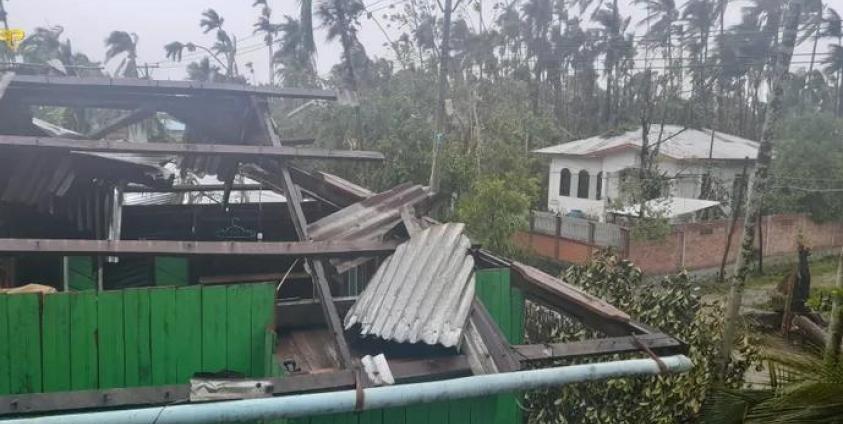It has been three months since Cyclone Mocha struck Rakhine on August 14, yet aid workers in the region have stated that approximately 70 percent of the cyclone-affected population still lacks proper shelter.
In cyclone-affected townships such as Sittwe, Ponnagyun, Rathedaung, Kyauktaw, Myebon, Minbya, Pauktaw, Buthidaung, Maungdaw, Ann, and Ramree (Yanbye), residents are still encountering challenges in attaining safe shelter.
"In Kyauktaw, following Cyclone Mocha, only 25 percent of the area has been reconstructed. Typically, the residents are dwelling in makeshift structures made from tarpaulins. On the Yo Chaung side, situated far from the highway, there has been no rebuilding effort whatsoever," explained a female member of the Apaukwa Youths Association in Kyauktaw Township.
She further mentioned that the regions where shelters have yet to be established are typically those where information dissemination is limited, and there is a lack of connections to support networks.
"Right from the start, they faced a lack of information and struggled with their livelihoods. Now, it can be asserted that the situation has become even more demanding. Adding to this, the rice seeds have sustained damage. Their livelihoods revolve around gardening, and the impairment to their plants has exacerbated their challenges, making their means of support less feasible," she explained.
At present, the Arakan Army (AA) is engaged in relief efforts on the ground. However, given the extensive damage caused by the cyclone, civil society organizations have noted that the AA's capacity is insufficient to address all the needs.
A youth representing a civil organization in Rathedaung township said, "The number of villages is substantial, and it's not feasible for them to reach every single one. In Rathedaung, the entire township has been devastated, which makes it impossible to cover all areas."
Residents and social organizations on the ground said that the Military Council's rehabilitation efforts on the ground are inadequate, and a considerable number of local residents in the region are still without proper shelter.
The Military Council has officially declared all 17 townships in Rakhine State as natural disaster areas. Additionally, they have stated their commitment to accelerating recovery efforts within a two-month timeframe following the cyclone's occurrence.
However, starting from June 7, the Military Council imposed a ban on aid initiatives from both international organizations and social aid groups to the regions impacted by the cyclone.
Consequently, the United Nations Office for the Coordination of Humanitarian Affairs (UNOCHA) released a statement on June 9 addressing the Military Council's imposed ban. International organizations have consistently appealed to the Military Council, urging them to grant permission for travel and assistance, in order to facilitate the recovery of the individuals impacted by the cyclone.
The individuals in the cyclone-affected area continue to require international assistance for the efficient execution of recovery efforts.
In the beginning of July, Military Council Chairman Senior General Min Aung Hlaing personally visited Sittwe, Buthidaung, and Rathedaung townships, asserting that the rehabilitation endeavors for the individuals impacted by the cyclone have been accomplished successfully.
However, the situation on the ground tells a different story, as those affected by the cyclone are grappling with difficulties without receiving aid from the Military Council. Additionally, a significant portion of the population still remains unable to repair their homes.
Cyclone Mocha struck Rakhine on May 14, resulting in the loss of 148 lives and the destruction of hundreds of thousands of buildings.
Additionally, tens of thousands of livestock have been impacted, and numerous farmlands have suffered damage due to saltwater intrusion. Moreover, stored grain belonging to farmers has also been damaged.







